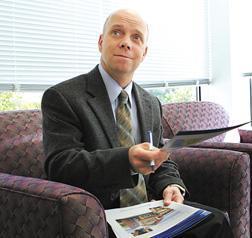Skater shares his story
AMBER TRILLO<br><br>Skater Scott Hamilton holds plans for the new Cancer Center at Highline Medical Center during an appearance at the Burien facility.
Wed, 10/12/2005
Times/News
After years of competing on ice, Olympic gold medalist and four-time world champion figure skater Scott Hamilton faced his greatest challenge - a fight with cancer.
Hamilton discussed this battle with humor and words of inspiration at Highline Medical Center's new Cancer Center Oct. 1.
Stepping onto a phone book to elevate his 5 foot 3 inch frame, Hamilton was greeted with a standing ovation from the crowd gathered to see him.
"Your goal is to put this brand new beautiful building out of business," he challenged the audience after congratulating the medical center on its new Cancer Center.
After years in the public eye, Hamilton was diagnosed with testicular cancer in 1997.
He responded to the diagnosis with determination and optimism.
"I'll always be the stupid ultimate optimist because I was forced to be that way," Hamilton said.
His parents, both school teachers, adopted Hamilton when he was baby. When he was five, he went through his first health scare - he stopped growing.
His mother noticed something was wrong when he was still able to walk underneath a table that he had walked under the year before.
After being misdiagnosed, they went to a doctor in Boston who found nothing physically wrong with him.
They returned home where Hamilton was encouraged to start skating at a new local ice rink.
"Being the smallest, sickest and the one never chosen in class, my self-esteem wasn't huge growing up," Hamilton said.
Through skating, his body started to physically change and his health started to improve - and he started growing again.
His weekly visits to the skating rink turned into daily visits.
"The only problem was, I wasn't very good compared to the standard of the day," said Hamilton.
He left home when he was 12 years old to further his training and that year, after numerous failed tryouts, he qualified for nationals.
That year in front of 17,562 people he fell five times and came in last. The next year he took ninth place out of 10.
"I did beat that guy," said Hamilton with a laugh.
He then advanced to the junior level and came in seventh.
"Throughout this I'm learning, but my parents are running out of money," Hamilton said.
On his brother's birthday that year, his mother informed the family that doctors had found three lumps in her breast.
"I wasn't sure what that meant," said Hamilton.
While she was going through chemotherapy, his mother went back to school to get a better job, but it wasn't enough to keep him in skating.
His parents told him they couldn't afford it any more and that this would be his last year and to enjoy it while it lasted.
"The curse was shaking its fist at me," Hamilton said.
Because that was his last year, he worked harder than ever and became the 1976 Men's Junior National Champion.
On the way to the championship, his mother met a couple, Frank and Helen, who loved the sport and wanted to encourage a young skater.
They wanted to pick up the expenses and keep Hamilton skating.
Hamilton, then 19, responded by losing focus and placed ninth at nationals in 1977.
A realization came to Hamilton following nationals that it was the last competition his mother would see; she died from cancer later that year.
The doctor said, "'Your mother is gone,' and I said 'Okay,'" Hamilton said, choking back tears.
That was a turning point in his skating career.
He came in fifth at the World Championships and was ranked second in the world when three skaters retired the next year.
In 1981, after skating at nationals, he stepped off the ice and was informed that his father was in the hospital after suffering from a stroke.
His father refused to take medications until Hamilton got there.
The first thing his father asked was how he did.
"We had a big night, Dad," Hamilton said. "David Santee (the favorite in that competition) skated really well."
His father then asked how he did, but Hamilton told him the other skaters also did well that night.
Again his father asked how he did.
"I got three 6.0s (the top score) and I won," Hamilton said.
But after winning the world champions, "I was defeated by my own success," said Hamilton. "The sport of skating must really stink if I'm the world champion."
In 1984, he went to the Olympics for the second time and won the gold medal.
While standing on the podium, "all I could think about was my mother," Hamilton said.
In 1985, with help from his manager, he started Stars on Ice, which is celebrating its 20th anniversary this year.
After his 11th year of skating in Stars on Ice, Hamilton didn't feel well and went to the doctor who found a testicular mass.
All he could think about was, "How can I deal with this enormous responsibility?
"But the fear is replaced right away with determination. For every blessing there is a curse."
When he was diagnosed with testicular cancer, he told the doctors, "I'm kind of a public person and I am going to have to talk about this."
But after participating in a cancer-survivor event in Chicago - and with the help of a 17-year-old girl battling cancer - his outlook changed.
She said that the worst thing that ever happened to her was cancer, and the best thing that ever happened to her was cancer, Hamilton said.
He realized that he had it all wrong, and that for every curse there is a blessing.
"We have to take advantage of every minute that we are given," said Hamilton. "The only disability in life is a bad attitude."


